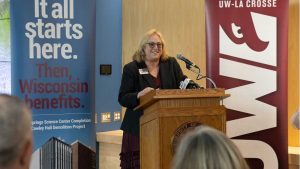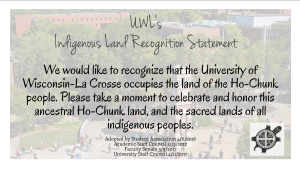Three-part program aims to change racial inequality
April 8, 2015
ds of being comfortable with the campus climate are 88 percent lower for non-white students.”
These surveys indicated that there are some definite race-related issues and concerns from students, explained Laurie Cooper Stoll, professor of sociology and archaeology at UW-La Crosse.
On March 10, a three part program entitled “UWL Speaks on Race: Listen, Learn, Lead” started in order to address some of the race-related issues on campus. The second of the three installments of these race dialogues took place on Tuesday, March 31 in Centennial Hall.
Sponsored by Campus Climate, the race dialogues were created in response to the results of recent Campus Climate surveys. Stoll has hopes for this program and its purpose.
“We hope this small step will help us move at least a little closer to addressing these inequalities,” she said.
Ray Block, Jr., a professor in the Department of Political Science and Public Administration, commented that although students can listen to accounts of racial inequality and injustice, they must learn about them and what drives them in order to create some relief.
“You might get uncomfortable, you might get a headache, you might not like what we’re talking about, but that’s how you learn. Challenge yourselves. Challenge yourselves in ways that allow you to become more conversant and willing to learn about the issues of race,” he said.
Learning is exactly what this second installment aimed to accomplish.
Audience members of many different cultures, ethnicities and races broke off into groups and conversed about what types of experiences they’d had regarding racial inequality so that they could become more aware of the feelings that go along with being viewed as “racially inferior.”
“I identify myself as being black. I wake up everyday and look in the mirror and see myself as black. I can’t change that. And nobody should dismiss the color of my skin because it is something that is ultimately a part of me and what I bring to the table,” said Antoiwana Williams, the Director of Multicultural Student Services.
Ultimately, the purpose of these conversations with other group members was to evoke feeling as a way of learning.
However, listening and generating feeling within isn’t where change ends or is by any means accomplished.
The third installment, Lead, will take place on April 21 in Centennial Hall from 7 to 9 p.m. and will focus on how individuals can take the feelings they are experiencing from hearing these dialogues and implementing ways of starting to change racial inequality.
Williams also stated, “Being a black woman, feeling like I’m constantly being marginalized is something that I deal with everyday.”
Through these dialogues, Campus Climate is aiming to reverse thoughts like these and to make this no longer an issue at the UW-L campus.





